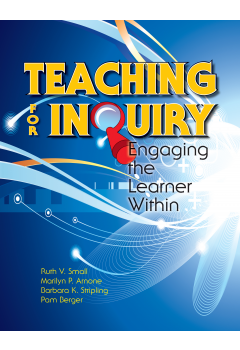Primary tabs
You don't need to be an ALA Member to purchase from the ALA Store, but you'll be asked to create an online account/profile during checkout to proceed. This Web Account is for both Members and non-Members. Note that your ALA Member discount will be applied at the final step of the checkout process.
If you are Tax-Exempt, please verify that your account is currently set up as exempt before placing your order, as our new fulfillment center will need current documentation. Learn how to verify here.
- Description
- About the authors
The American Association of School Librarians’ (AASL’s) Standards for the 21st-Century Learner define “inquiry” as a “stance toward learning in which the learner is engaged in asking questions and finding answers, not simply accumulating facts presented by someone else that have no relation to previous learning or new understanding. Inquiry follows a continuum of learning experiences, from simply discovering a new idea or an answer to a question to following a complete inquiry process.”
Inquiry is a crucial vantage point for teaching information literacy, but where can school librarians turn for help meeting those standards?
Written by a “dream team” of school library leaders, Teaching for Inquiry will focus on this process, helping school library media specialists actively engage and motivate their students in learning. The authors go over the most important instructional models and help readers integrate these and new standards into their own teaching.
The book even comes with a companion website including videos of librarians teaching and student learning that bring the various teaching techniques and motivational strategies described in the book to life!
The planning tools, models, and methods featured in Teaching for Inquiry will provide essential guidance to librarians looking to engage their students in the world of information.
Check out this title's companion website!
Ruth V. Small
Ruth V. Small, PhD, is Laura J. & L. Douglas Meredith Professor and Director of the School Media Program in the School of Information Studies at Syracuse University (iSchool @ Syracuse). Her expertise is in the area of motivation, which she applies to a variety of information contexts, including inquiry teaching and learning in libraries. She has received two major national awards for her research in this area and has authored or co-authored more than 100 publications, including six books. Her current research focuses on the librarian’s role in fostering children’s creativity and innovative thinking; she shares some of her findings in this book. As founding director of Syracuse University’s Center for Digital Literacy, Ruth has led or co-led more than 20 funded projects, including S.O.S. for Information Literacy, a multimedia database of lesson plans and teaching ideas, PLUS: Preparing Librarians for Urban Schools, a program for preservice librarians committed to working in high-needs school libraries, and Project ENABLE: Expanding Nondiscriminatory Access By Librarians Everywhere, a project to train school librarians on ways to design and implement effective programs, resources, and services for students with disabilities. She has 12 years of experience as a K–12 classroom teacher and school librarian.
Marilyn P. Arnone
Marilyn P. Arnone, PhD, is a Research Associate Professor in the iSchool @ Syracuse, teaches in the school media program, and serves as co-director for Syracuse University’s Center for Digital Literacy. Marilyn earned her doctorate in instructional design, development, and evaluation. Her recent research has explored perceived and actual competence in middle school children’s information and digital literacies and considered various dispositions for learning with a special interest in curiosity and motivation for learning. She has authored or co-authored numerous publications including a book titled Motivational Design: The Secret to Producing Effective Children’s Media (2005) and a series of Curious Kids storybooks with educator guides for introducing research skills to children in grades 1–3. She recently edited From the Creative Minds of 21st-Century Librarians with Ruth V. Small and Barbara K. Stripling, a free downloadable e-book published by the Center for Digital Literacy (http://digital-literacy .syr.edu). She is creator of Curiosity Creek, an online site for children in which older children create stories and materials for their younger counterparts in Pre-K to Grade 3. The mission of Curiosity Creek is to stimulate inquiry, imagination, and inventive thinking in the context of environmental science.
Barbara K. Stripling
Barbara K. Stripling, DPS, has had a 30-year career as a classroom teacher, a school library media specialist, a library grant program director, a school district director of libraries and instructional services, and director of library programs at New Visions for Public Schools, a local education fund in New York City. She is currently Director of Library Services for the New York City Department of Education and recently completed her Doctorate of Professional Studies at Syracuse University. She is the creator of the Stripling Model of Inquiry, which has been adopted by the Library of Congress for its Teaching with Primary Sources initiative. Stripling has written or edited numerous books and articles, including her latest book, Curriculum Connections Through the Library: Principles and Practice (Libraries Unlimited, 2003), co-edited with Sandra Hughes-Hassell. She is a former president of the American Association of School Librarians and a former member of the American Library Association Executive Board. She recently completed her degree in the executive doctorate program in the iSchool @ Syracuse, researching the effect of teaching with primary sources on the development of historical empathy.
Pam Berger
Pam Berger, CAS, is Director, Southern Westchester BOCES school library system, an educational technology/library consultant and trainer with more than 20 years of library experience, and adjunct faculty at the iSchool @ Syracuse. She is also publisher and editor of Information Searcher, the longest published newsletter in K–12 education designed specifically for professionals working to integrate technology into the curriculum and the library program.Her most recent book is Choosing Web 2.0 Tools for Learning and Teaching in a Digital World (2010). Pam has a Certificate of Advanced Study in School Administration from the College of New Rochelle.



